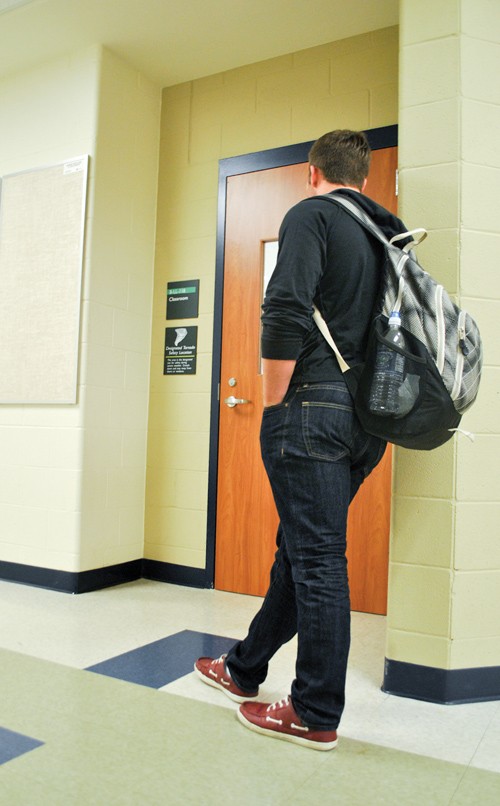In-class finals required no matter the exam format

GVL / Allison Young A student waits paitently outside of a classroom for the students to clear the room.
Apr 19, 2012
With the end of the school year fast approaching, students and professors all over the country are frantically prepping for final exams. And even if the class final is not a formal test, Grand Valley State University requires all classes to have a last face-to-face meeting.
“University policy states that all classes must meet for a culminating experience during final exam week, on the appropriate scheduled exam day and time,” said Mary Schutten, associate dean of the College of Liberal Arts and Sciences.
All the departments of the university are required to meet during exam periods for a final, whether it is an exam, paper, project or other class activity. The policy is not specific on what the format has to be, whether a cumulative, a test on recent material or other final projects, but demands only that it be some kind of culminating experience, said Anthony Nieuwkoop, the chairman of the biomedical sciences department.
Although some on campus do not agree with this policy, others think it is a good one to have.
“Students are paying per credit hour,” said Joseph McCargar, a broadcasting professor in CLAS. “If they don’t meet for that number of hours, students are paying for more credit hours than the professor is giving them. The professor has an obligation to give their time for their students.”
The university has no way of monitoring whether all professors follow this policy, but it is expected of all professors to do so, Nieuwkoop said.
“It’s a fair policy to have,” Nieuwkoop said. “It’s making sure everything is complete and wrapping everything up,” he said.
Schutten said professors who do not follow the finals policy are first informed that they are not complying with the university policy, but after the initial warning, the offense would be handled at the department level. She said she believes that the policy is in the best interest of the students.
“It is certainly in the students’ interest,” Schutten said. “We do our best to make sure students are successful.”
There is value in a having a final face-to-face meeting, McCargar said.
“It gives a chance to summarize the course and gives exposure to the material,” he said. “It’s a great time to sum up the course both academically and aesthetically.”
While some students might prefer using non-exam culminating experiences as study time for other finals, professors are required to meet one last time as a class to give some type of evaluation for their students to see what they learned and got out of the course.
McCargar said part of the reason he thinks it is a good policy is because the last class meeting gives the professor a chance to find out what the students’ plans are, collect suggestions for future course and give guidance for improvement and overall success.
“It’s just one of the things we all get to do to finish up the semester and mark it done,” Nieuwkoop said.
shillenbrand@
lanthorn.com























